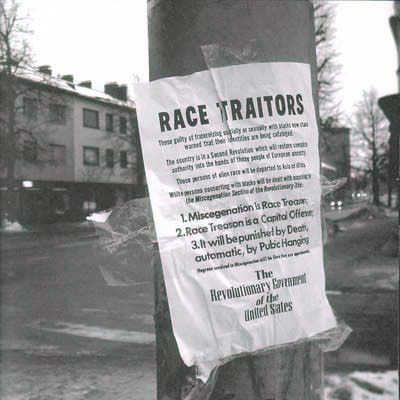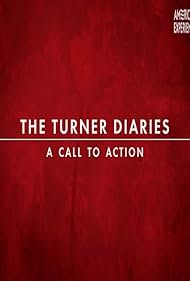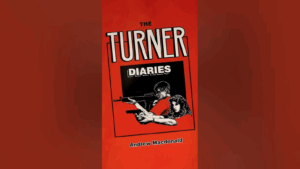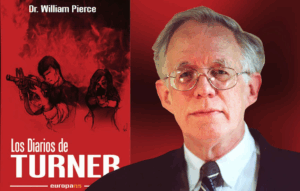of The Turner Diaries, 5
Woe betide any whining conservative, “responsible” or otherwise, who gets in the way of our revolution when I am around! I will listen to no more excuses from these self-serving collaborators but will simply reach for my pistol. [page 93]
______ 卐 ______
 Our whole strategy against the System was failing. It was failing because the great bulk of White Americans were not responding to the situation in the way we had hoped they would. That is, we had counted on a positive, imitative response to our “propaganda of the deed,” but it was not forthcoming.
Our whole strategy against the System was failing. It was failing because the great bulk of White Americans were not responding to the situation in the way we had hoped they would. That is, we had counted on a positive, imitative response to our “propaganda of the deed,” but it was not forthcoming.
We had hoped that when we set the example of resisting the System’s tyranny, others would resist too. We had hoped that by making dramatic strikes against top System personalities and important System facilities, we would inspire Americans everywhere to initiate similar actions of their own. But, for the most part, the bastards just sat on their asses.
Sure, a dozen or so synagogues were burned, and there was an overall rise in the level of politically motivated violence, but it was generally misdirected and ineffective. Without organization such activities have little value, unless they are very widespread and can be sustained over a long period.
And the System’s response to the Organization irritated many people and caused a lot of grumbling, but it didn’t even come close to provoking a rebellion. Tyranny, we have discovered, just isn’t all that unpopular among the American people. What is really precious to the average American is not his freedom or his honor or the future of his race, but his pay check. [here and below—emphasis added by Ed.] He complained when the System began busing his kids to Black schools 20 years ago, but he was allowed to keep his station wagon and his fiberglass speedboat, so he didn’t fight.
He complained when they took away his guns five years ago, but he still had his color TV and his backyard barbeque, so he didn’t fight.
And he complains today when the Blacks rape his women at will and the System makes him show an identity pass to buy groceries or pick up his laundry, but he still has a full belly most of the time, so he won’t fight.
He hasn’t an idea in his head that wasn’t put there by his TV set. He desperately wants to be “well adjusted” and to do and think and say exactly what he thinks is expected of him. He has become, in short, just what the System has been trying to make of him these past 50 years or so: a mass-man; a member of the great, brainwashed proletariat; a herd animal; a true democrat.
That, unfortunately, is our average White American. We can wish that it weren’t so, but it is. The plain, horrible truth is that we have been trying to evoke a heroic spirit of idealism which just isn’t there any more. It has been washed right out of 99 per cent of our people by the flood of Jewish-materialist propaganda in which they have been submerged practically all their lives.
As for the last one per cent, there are various reasons why they aren’t doing us much good. Some, of course, are too ornery to work within the confines of the Organization—or any organized group; they can only “do their own thing,” as a number, in fact, are. The others may still have different ideas of their own, or they simply may not have been able to make contact with us since we were forced underground. Eventually we could recruit most of these, but we no longer have the time.
What the Organization began doing about six months ago is treating Americans realistically, for the first time—namely, like a herd of cattle. Since they are no longer capable of responding to an idealistic appeal, we began appealing to things they can understand: fear and hunger.
We will take the food off their tables and empty their refrigerators. We will rob the System of its principal hold over them. And, when they begin getting hungry, we will make them fear us more than they fear the System. We will treat them exactly the way they deserve to be treated.
I don’t know why we held back from this approach for so long. We have had the example of decades of guerrilla warfare in Africa, Asia, and Latin America to instruct us. In every case the guerrillas won by making the people fear them, not love them. By publicly torturing to death village leaders who opposed them and by carrying out brutal massacres of entire village populations which refused to feed them, they inspired such terror in neighboring villages that everyone was afraid to refuse them what they asked.
We Americans observed all this but failed to apply the lesson to ourselves. We regarded—correctly—all those non-Whites as mere herds of animals and were not surprised that they behaved as they did. But we regarded ourselves—incorrectly—as something better.
There was a time when we were better—and we are fighting to insure that there will be such a time again—but for now we are I merely a herd, being manipulated through our basest instincts by a pack of clever aliens. We have sunk to the point where we no longer hate our oppressors or try to fight them; we merely fear I them and attempt to curry favor with them.
So be it. We will suffer grievously for having allowed ourselves to fall under the Jewish spell.
We stopped wasting our resources in small-scale terror attacks and shifted to large-scale attacks on carefully selected economic targets: power stations, fuel depots, transportation facilities, food sources, key industrial plants. We do not expect to bring down the already creaky American economic structure immediately, but we do expect to cause a number of localized and temporary breakdowns, which will gradually have a cumulative effect on the whole public.
Already a sizable portion of the public has been made to realize that it will not be allowed to sit back and watch the war on TV in safety and comfort. In Houston, for example, hundreds of thousands went for nearly two weeks without electricity last September. The food in their refrigerators and freezers quickly spoiled, as did the perishables in their supermarkets. There were two major food riots by hungry Houstonians before the Army was able to set up enough relief stations to handle everyone. […]
And the conservatives, of course, have redoubled their squawking and cackling that we’re ruining all chances for an improvement in conditions by “provoking” the government with our violence. What the conservatives mean when they talk of an “improvement” is a stabilization of the economy and another round of concessions to the Blacks, so that everyone can return to consuming in multiracial comfort.
But we learned long ago not to count our enemies, only our friends. And the number of the latter is growing now. Henry indicated that we have increased nearly 50 per cent in membership since last summer. Apparently our new strategy has knocked a lot of spectators off the fence—some on our side and some on the other. Perceptive people are beginning to realize that they won’t be able to sit this war out. We are forcing them into the front lines, where they must choose sides and participate, whether they like it or not. [pages 100-103]








